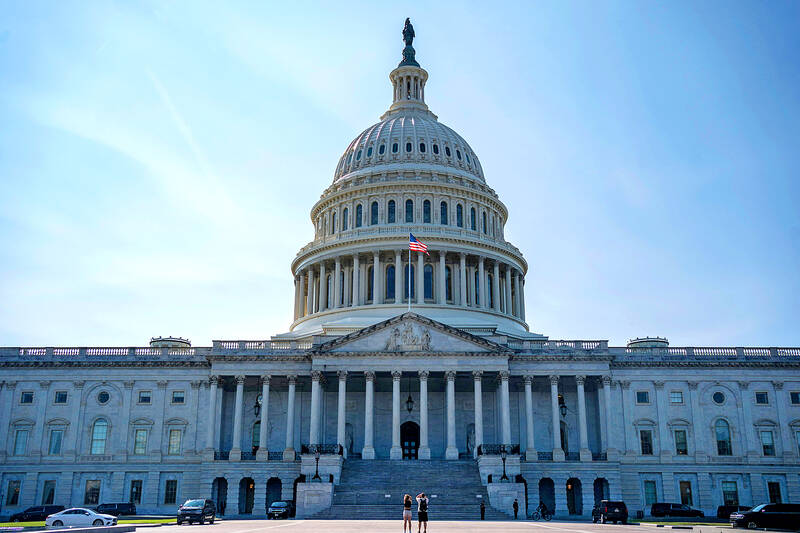The Pacific Partnership Act, unanimously passed by the US House of Representatives on Monday, aims to bolster cooperation with Taiwan and the Pacific Islands Forum (PIF), its backers said.
Introduced by US Representative Ed Case early this year, the bill emphasizes the importance of US collaboration with key allies and partners, including Taiwan, Australia, Japan, New Zealand and South Korea, as well as regional organizations such as the PIF.
Unlike other bills introduced recently, such as the Taiwan Conflict Deterrence Act, the Pacific Partnership Act does not explicitly target China.

Photo: AFP
Instead, it requires the US president and the US secretary of state to develop a Pacific partnership strategy, focusing on the region’s vulnerabilities to threats such as natural disasters, foreign military actions, economic coercion and corruption.
The PIF, which is mentioned multiple times in the Pacific act, has become a diplomatic flashpoint between Taiwan and China. The south Pacific has long been a contested area of influence for both nations, with the PIF as a critical platform.
Deputy Minister of Foreign Affairs Tien Chung-kwang (田中光) last month attended the forum, as did Chinese Special Envoy for Pacific Island Countries Affairs Qian Bo (錢波).
The Solomon Islands sought to block Taiwan’s participation in future forums, reports said.
A draft communique reaffirming Taiwan’s status was reportedly removed due to pressure from China.
During discussions on the Pacific Partnership Act, US Representative Amata Coleman Radewagen said that China’s influence was growing in the region, pointing to its 2022 security agreement with the Solomon Islands.
The bill calls for coordinated US efforts with allies to ensure effective aid programs in the Pacific without duplication, Radewagen said.
Although the bill has cleared the House, it faces a narrow window for approval by the US Senate, given US presidential elections in November and a congressional recess.

A magnitude 5.6 earthquake struck off the coast of Yilan County at 12:37pm today, with clear shaking felt across much of northern Taiwan. There were no immediate reports of damage. The epicenter of the quake was 16.9km east-southeast of Yilan County Hall offshore at a depth of 66.8km, Central Weather Administration (CWA) data showed. The maximum intensity registered at a 4 in Yilan County’s Nanao Township (南澳) on Taiwan’s seven-tier scale. Other parts of Yilan, as well as certain areas of Hualien County, Taipei, New Taipei City, Taoyuan, Hsinchu County, Taichung and Miaoli County, recorded intensities of 3. Residents of Yilan County and Taipei received

Taiwan has secured another breakthrough in fruit exports, with jujubes, dragon fruit and lychees approved for shipment to the EU, the Ministry of Agriculture said yesterday. The Animal and Plant Health Inspection Agency on Thursday received formal notification of the approval from the EU, the ministry said, adding that the decision was expected to expand Taiwanese fruit producers’ access to high-end European markets. Taiwan exported 126 tonnes of lychees last year, valued at US$1.48 million, with Japan accounting for 102 tonnes. Other export destinations included New Zealand, Hong Kong, the US and Australia, ministry data showed. Jujube exports totaled 103 tonnes, valued at

TRUST: The KMT said it respected the US’ timing and considerations, and hoped it would continue to honor its commitments to helping Taiwan bolster its defenses and deterrence US President Donald Trump is delaying a multibillion-dollar arms sale to Taiwan to ensure his visit to Beijing is successful, a New York Times report said. The weapons sales package has stalled in the US Department of State, the report said, citing US officials it did not identify. The White House has told agencies not to push forward ahead of Trump’s meeting with Chinese President Xi Jinping (習近平), it said. The two last month held a phone call to discuss trade and geopolitical flashpoints ahead of the summit. Xi raised the Taiwan issue and urged the US to handle arms sales to

BIG SPENDERS: Foreign investors bought the most Taiwan equities since 2005, signaling confidence that an AI boom would continue to benefit chipmakers Taiwan Semiconductor Manufacturing Co’s (TSMC, 台積電) market capitalization swelled to US$2 trillion for the first time following a 4.25 percent rally in its American depositary receipts (ADR) overnight, putting the world’s biggest contract chipmaker sixth on the list of the world’s biggest companies by market capitalization, just behind Amazon.com Inc. The site CompaniesMarketcap.com ranked TSMC ahead of Saudi Aramco and Meta Platforms Inc. The Taiwanese company’s ADRs on Tuesday surged to US$385.75 on the New York Stock Exchange, as strong demand for artificial intelligence (AI) applications led to chip supply constraints and boost revenue growth to record-breaking levels. Each TSMC ADR represents